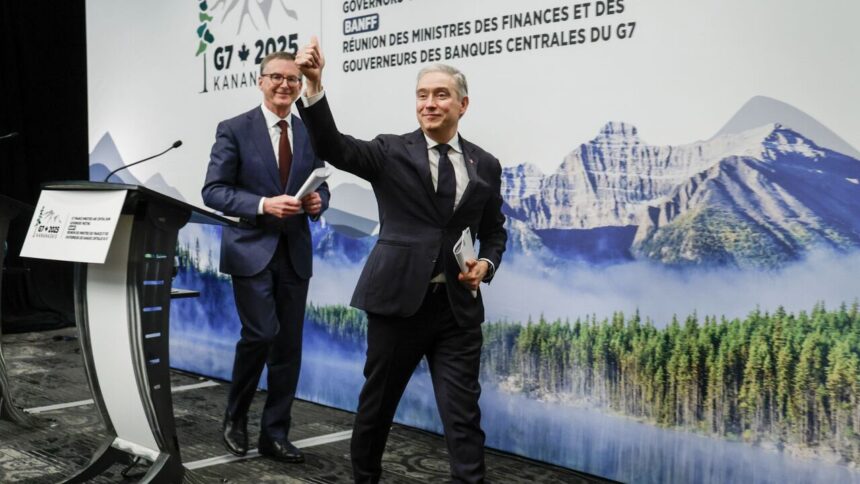As the June sunshine breaks through Calgary’s characteristically unpredictable spring weather, our downtown core finds itself hosting what might be the most significant international gathering in our city since the 1988 Olympics. The G7 Finance Ministers Meeting has officially begun, bringing with it a whirlwind of economic discussions, security measures, and global attention to our doorstep.
Walking through the cordoned areas near the Telus Convention Centre yesterday, I couldn’t help but notice the transformation. Areas normally bustling with the usual mix of office workers and tourists now showcase a carefully choreographed dance of diplomatic vehicles and security personnel. It’s a rare glimpse into the mechanics of global governance playing out on Stephen Avenue.
“This summit represents a unique opportunity for Calgary to demonstrate its growing position as a key player in Canada’s economic future,” Mayor Jyoti Gondek told me during a brief exchange outside City Hall. Her enthusiasm was palpable as she described the potential long-term benefits beyond the immediate economic boost from the delegations.
The financial implications for our city are substantial, with estimates suggesting an immediate $10 million injection into the local economy. Hotels throughout the downtown core report being at capacity, and restaurants have been preparing special menus highlighting Alberta’s agricultural bounty. Yet beneath this economic optimism lies a complex security operation that has reshaped downtown mobility.
Calgary Police Service, working alongside RCMP and international security teams, has implemented what they call a “proportionate response” to potential threats. Deputy Chief Chad Tawfik explained, “We’ve developed a security plan that balances public safety with minimizing disruption to daily life.” Nevertheless, many downtown workers have opted to work remotely this week, a flexibility that would have seemed impossible pre-pandemic.
The summit agenda focuses heavily on issues that resonate deeply here in Alberta: energy transition policies, inflation management, and the financing of critical infrastructure. These discussions carry particular weight in our province, where economic diversification beyond traditional energy sectors continues to be both a challenge and an opportunity.
Finance Minister Chrystia Freeland, hosting her counterparts from the United States, United Kingdom, France, Germany, Italy, and Japan, emphasized Canada’s perspective during her opening remarks. “We face global challenges that require collaborative solutions,” she stated, while standing alongside Bank of Canada Governor Tiff Macklem. “From climate finance to the digital economy transformation, our discussions here will shape policy directions for years to come.”
What makes this gathering particularly noteworthy is its timing. With global inflation pressures showing signs of easing but remaining above central bank targets, the policy directions emerging from these closed-door sessions may influence interest rate decisions that directly impact Calgarians’ mortgages, business loans, and overall cost of living.
Local economic experts see potential benefits beyond the immediate spotlight. Mount Royal University economics professor Anupam Das believes “the summit reinforces Calgary’s emergence as more than just an energy headquarters, but as a center for financial services and economic policy development in Western Canada.”
For downtown businesses that weathered pandemic closures and the subsequent work-from-home revolution, the influx of international visitors represents a welcome boost. James Vickery, owner of a family-run café on 8th Avenue, shared with me that “after years of uncertainty, seeing our establishment filled with international delegates and their staff feels like a turning point.”
Yet not everyone views the gathering with such optimism. A planned demonstration by climate activists tomorrow will highlight the tensions between economic growth models discussed inside the venue and environmental concerns that resonate strongly with many Calgarians, particularly younger residents.
The security presence, while necessary, has also prompted conversations about the mounting costs of hosting such high-profile international events. The federal government has covered the security bill, estimated at several million dollars, but questions remain about whether such expenditures deliver lasting value beyond the temporary spotlight.
For everyday Calgarians, the most visible impact has been transportation adjustments. Several downtown streets remain closed, and public transit routes have seen temporary modifications. City officials recommend checking the Calgary Transit website for real-time updates throughout the week.
As delegates retire to their hotels this evening, preparations continue for tomorrow’s main sessions. The decisions and policy directions emerging from this summit may seem abstract, but they’ll eventually translate into tangible impacts on everything from our energy sector’s future to the interest rates on our credit cards.
This temporary role as the center of global financial governance reminds us of Calgary’s evolving identity. No longer just an oil and gas town, but increasingly a city where international policy discussions find a natural home. Whether that evolution continues after the barriers come down and the delegates depart remains the more interesting long-term question for our city’s future.







